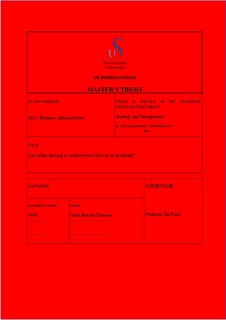Can urban farming in southwestern Norway be profitable?
Master thesis
Permanent lenke
http://hdl.handle.net/11250/2616585Utgivelsesdato
2019-06Metadata
Vis full innførselSamlinger
- Studentoppgaver (Business) [1035]
Sammendrag
Abstract:
Commercial urban farming is a common phenomenon in developed countries, and urban actors find numerous ways to utilize vacant land for food-production purposes. One of the limitations of farming in urban environments is land scarcity, and as a result, production volumes are low compared to the rural counterpart. As a result, profit margins tend to be low, and economies of scale are hard to achieve. This requires alternative methods of production and supply. Through alternative food-supply chains, products can be sold directly to the customers, facilitating higher profit margins. In Norway, commercial urban farming is a relatively new phenomenon. There is not a lot of actors as of yet, and information about the topic is scarce.
The purpose of this thesis was to explore whether urban farming in southwestern Norway can be profitable. To investigate the matter, research into business models for urban farming has been conducted, along with studies of alternative short food supply chains (SFSC).
The thesis is a comparative case-analysis of four study objects located in the urban-, and peri-urban areas around Stavanger, operating with various farming activities involving vegetable production. Data was collected through interviews, and results were analyzed in reference to a theoretical framework of urban farming, business models and short food supply chains.
Results from the analysis suggest that given the right circumstances; by producing the right product and utilizing the supply chain most appropriate for the business model and product in question, urban farming can be profitable as long as the Norwegian economy is good.
Beskrivelse
Master's thesis in Strategy and Management

